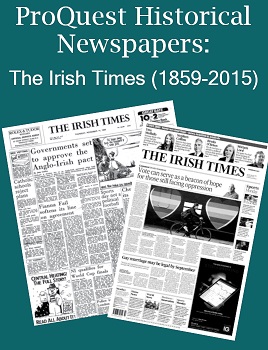 Digital versions of The Irish Times (1859-2022) and the Weekly Irish Times (1876-1958).
Digital versions of The Irish Times (1859-2022) and the Weekly Irish Times (1876-1958).
Use the Irish Times (1859-2022) now
Key features
Full access to these historical newspapers: Users can study the progression of issues over time by browsing issues of The Irish Times and the Weekly Irish Times, which offers coverage of 1859-2022 and 1876-1958, respectively, including news articles, photos, advertisements, classified ads, obituaries, cartoons, and more.
Insight into multiple perspectives: Not only does presenting this newspaper on the ProQuest platform allow for cover-to-cover browsing of complete issues of this newspaper, but users can find a broader view of issues and events by cross searching all of ProQuest’s full-run, full-image historical newspapers.
User-friendly support tools to facilitate research: Users benefit from the ability to search by more than 20 article types, keyword, date ranges, specific dates, author and more. They can also focus on relevant information quickly with hit-term highlighting and download articles and images in PDF format.
Use at a library or enter your library card & password / PIN.
More Information
Explore nearly 150 years of the Emerald Isle’s turbulent history, rich culture, and complex political climate with The Irish Times (1859-2022) and the Weekly Irish Times (1876-1958). From the aftermath of the Great Famine, the launch of the Titanic, and the Easter Rising of 1916, to the World Wars, the Troubles, and today’s most pressing global social issues, Ireland’s “only independent newspaper” lends its authoritative voice to local and international events alike.
The Irish Times provides comprehensive news reporting as well as sports, business, arts, lifestyle coverage, and more. Each issue contains in-depth analysis and lively debate of current events. The Weekly Irish Times’ coverage includes The Times Pictorial. These titles provide access to prominent columnists, including arts commentator Fintan O’Toole, satirist Miriam Lord, former Prime Minister Garret FitzGerald, and opinion editorial writers like Tony Blair and Bill Clinton.
